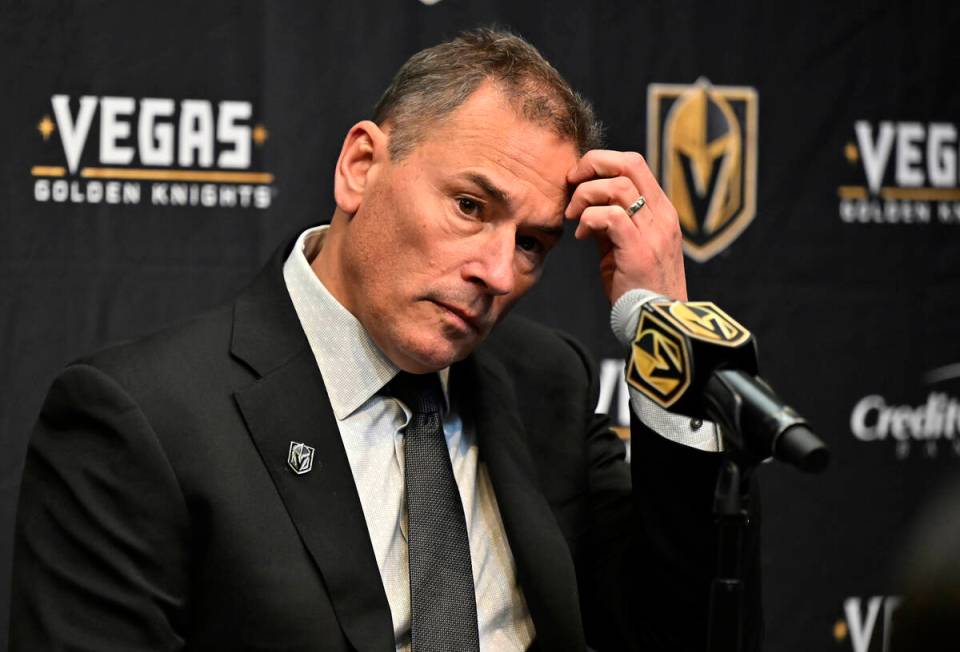Hill: Sorry, Bruce Cassidy, losses can be good thing for good teams

Might need Bruce Cassidy to divert his attention from the rest of this column.
The Golden Knights coach is probably not going to love it, even if he begrudgingly agrees on some level.
But the Knights’ loss to Montreal, as bad as it was to blow a third-period lead with some lackluster play, wasn’t the worst way to end 2024 and what has been an otherwise spectacular start to the season.
Cassidy, as always, said the right things at his postgame news conference. He is, after all, one of the best coaches most reporters have ever encountered at giving thoughtful answers regardless of his mood after a game.
And, trust me, he was seething. The constant and somewhat rhythmic tapping of his feet under the table was a dead giveaway to the rage he was holding back while trying to calmly explain the intricacies of the penalty kill or some other minute detail.
In the grand scheme of things, dropping two midseason points at the end of a 10-1 stretch isn’t the end of the world.
But Cassidy hates losing. Maybe more than he loves winning.
It’s probably a big part of why he has been so successful.
Rather win
Here’s the reality, though. Not all losses are created equal, and sometimes they are a necessary tool to remind a team, especially an elite one, that it can’t just show up and win every night. No matter how much better they are than an opponent, players must focus on the minor details every night to win games at this level.
That message is tough to deliver when you’re winning every night.
It’s a theory that was posed to Cassidy after his team bounced back with an impressive win Thursday night. He wasn’t fully on board.
“I see where you’re going with it, and, yes, coaches use those moments to get the players’ attention, and sometimes it works out for you and sometimes it might take two or three (losses),” Cassidy said. “That hasn’t happened to us too often, and hopefully not again to be honest with you.
“Let’s face it. You tend to get the players’ attention better when you lose. So that’s the advantage of it. I don’t like losing, so I can just throw that advantage out the window. I’d rather win and just have to remind the guys.”
Sure, but it seemed to work. Against Montreal, the Knights looked complacent after taking the lead. It almost seemed as if they expected to win again just because they were the better team and had won so often.
But the Canadiens hung around and took advantage of two chances to stun the Knights and the crowd. After a bit of a sluggish start against the Flyers, the Knights grabbed the lead and then made sure to put the game away by dialing up the pressure and turning a lead into a two-goal advantage and then scoring again.
“It was almost as if to show, ‘You’re not coming back like Montreal did the other night,’” Cassidy said.
Lesson learned.
‘Get ready for the next one’
It’s not impossible to learn from a victory, but those lessons become more and more difficult to deliver.
Think about your job. If you’re crushing it every single day and producing great results for the company, and yet at the end of the day, your boss is simply highlighting the things you’ve done wrong and warning you your method isn’t going to work forever, you’re probably going to start resenting the messenger.
“We teach after most every game,” Cassidy said. “Some of the teaching is less and it’s more about reinforcing the positive when it’s going well. But during that stretch of December, there were lots of days where we had to go in and talk about, ‘This is why we didn’t get off to a good start’ or ‘This is why we gave up that goal.’ But there are definitely good teachable moments when you lose.”
Cassidy knows his team very well. He believes they have been good at taking in lessons even after wins.
“Our group is not going to walk home tonight and say they played perfect by any means,” he said after Thursday’s win. “So we’ll talk about the (sluggish) first period, move on and get ready for the next one.”
There wasn’t a whole lot of toe tapping during that answer.
Winning has that effect.
Contact Adam Hill at ahill@reviewjournal.com. Follow @AdamHillLVRJ on X.